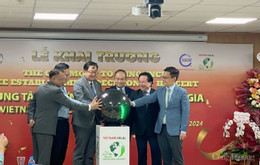Checks on halal food from ‘farm to fork’
The certification scheme has been in the pipeline for years and is still “under discussion”, said Khalid Sherif, director of food control department at Dubai Municipality.
There is currently no nation-wide system to certify products as halal, which means conforming to Islamic standards. Under Sharia law, animals must be slaughtered in line with religious rites and food must be free of pork and alcohol, among other requirements.
Meat products are marked halal by packagers but not by a single authority that places an official halal stamp or sticker.
However, the municipality is working with the federal Emirates Standardisation and Metrology Authority (Esma) on the national certification, Sherif said.
“We may bring it [certification] for the UAE or even the global market. It’s still under discussion. There’s no [federal] certification right now. The idea is to make it one, so it’ll be the one halal certification body,” he added.
The discussions extend to Esma’s central role in halal certification recognised by the Organisation of Islamic Cooperation (OIC), which has 57 member states.
The UAE Halal Scheme developed by Esma is based on guidelines issued by the Turkey-based Standardisation and Metrology Institute of Islamic Countries, which works under the banner of the OIC.
In Dubai, food is checked “at source” for its compliance with halal standards, Sherif said. It is understood the municipality coordinates the task with halal certification bodies in source countries.
However, the focus now is to “go full circle” and check halal compliance “from farm to fork”, said Hussain Lootah, the municipality’s director- general.
Lootah’s comments came on Monday during the announcement of the Dubai International Food Safety Conference that takes place next month.
“There’s big demand for halal food. Dubai is the capital of the Islamic economy; we’re looking at halal food [closely] for placing of specifications and we will be implementing this.
“From farms, the slaughtering, transport, the market to the table – everything has to comply with Sharia [Islamic law].”
The municipality will also focus on halal food during the conference, Lootah added.
In May, Esma approved a list of proposed brands for the national halal industry. And, in 2012, the UAE was granted a three-year chairmanship of the first OIC technical committee for halal food standards.




